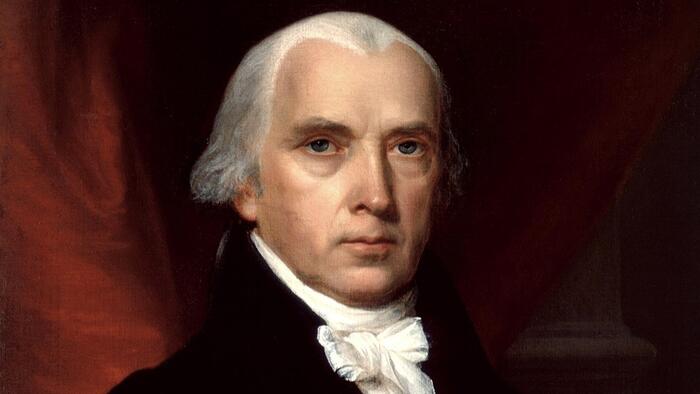


Authored by Susan Brynne Long via RealClearPublicAffairs,
On June 8, 1789, James Madison rose before Congress and performed an about-face. The founder who had opposed the addition of a bill of rights to the Constitution conceded to pressure from advocates of adding amendments to protect Americans against abuses of government power. He gave a speech in which he defended amendments he never wanted.
Madison understood that in the critical moment of the nascent republic, compromise was necessary to move the country forward. His example of moderation amidst hostile rhetoric on both sides is a timely reminder in our present moment of division.
Why did Madison not think a bill of rights was necessary in the American political context?
The framers, led by Madison, codified a reversal of the political order that existed in the British colonial system. The people, not the monarch, were the source of all governing authority in the new republic. Under the Constitution, the people delegated – but did not surrender – their authority to the government. According to many pro-Constitution Federalists, Madison among them, this made a bill of rights superfluous.
The issue over adding a bill of rights originated in the state constitutions. The Virginia Bill of Rights pronounced that all power “derived from the people” before enumerating the protected rights of Virginians. Opponents maintained that this was paradoxical, because it presumed the government’s authority to infringe upon the people, which was declared in the same document to be the source of all governing authority. Nonetheless, many Americans felt that such declarations of their rights were essential.
Speaking in support of this perspective, Thomas Jefferson wrote that “a bill of rights is what the people are entitled to against every government on earth, general or particular, and what no just government should refuse, or rest on interference.” Similar sentiments forced legislators in North Carolina to add a bill of rights to their constitution after their first convention did not draft one.
Madison was ultimately persuaded to change his position on the necessity of a bill of rights by those of Jefferson’s position. In a March 15, 1789, letter answering Madison’s opposition to the protectionary amendments, Jefferson implored his fellow founder that “the good in this instance vastly outweighs the evil.” Madison had posited that an exhaustive list of individual rights was impossible to achieve. Jefferson answered that “half a loaf is better than no bread. If we cannot secure all our rights, let us secure what we can.”
Madison went further than changing his mind: he became an opponent of his own position.
Addressing his fellow delegates to the Constitutional Convention in a steamy Independence Hall, Madison rebutted popular arguments raised against a bill of rights and acknowledged his change in position. “I will own that I never considered this provision … essential to the Federal Constitution,” he noted. But he conceded that the amendments were “neither improper nor altogether useless.”
Answering the argument that a bill of rights was irrelevant to the new American political order, Madison vilified the Constitution’s admission of discretionary authority. The document empowered Congress “to make all Laws which shall be necessary and proper” for the execution of its enumerated powers. A bill of rights, Madison contended, would offer a protection against abuse of this power.
The founder confronted the most formidable argument against adding a bill of rights to the Constitution. By enumerating the rights of the people, would the proposed amendments not “disparage those rights which were not placed in that enumeration?”
To critics raising such opposition, Madison pointed to his proposed amendments, which included careful language. The rights enumerated “shall not be so construed as to diminish the just importance of other rights retained by the people, or as to enlarge the powers delegated by the Constitution.” The Bill of Rights was not an exhaustive list, but rather an additional bulwark against possible abuses by the national government.
Ending his speech, Madison made an eloquent political appeal: “it will be proper in itself, and highly politic, for the tranquility of the public mind, and the stability of the Government” to add a bill of rights to the Constitution.
Madison could have stopped his argument there. Instead, he called for moderation in political rhetoric going forward.
The ratification debates had been fraught with vitriolic language and accusations. Madison took aim at his Antifederalist opponents who had charged Federalists with wanting to “lay the foundation of an aristocracy or despotism” by reordering the American government. Calling for compromise, Madison asked the Federalists to follow his lead and approve the Bill of Rights. This would prove that “they were as sincerely devoted to liberty and a republican government” as their opponents.
Madison’s commitment to cross-party compromise, and his appeal to temper political rhetoric, are relevant to our present moment. Democrats and Republicans alike often use dire, inflammatory language when discussing a range of contemporary issues. The impending financial shortfall of Social Security could cause a devastating recession. President Trump’s 2024 election signaled “the end of democracy” in America. Over 200 years ago, similar rhetoric spurred James Madison not to greater indignation, but to a political sacrifice that led to the ratification of the U.S. Constitution.
Between ideology and national unity, and even survival, Madison chose the latter. Modern lawmakers would be wise to reflect on his example.
Susan Brynne Long, Ph.D., is a historian at the U.S. Army Center of Military History and a fellow with the Jack Miller Center.
